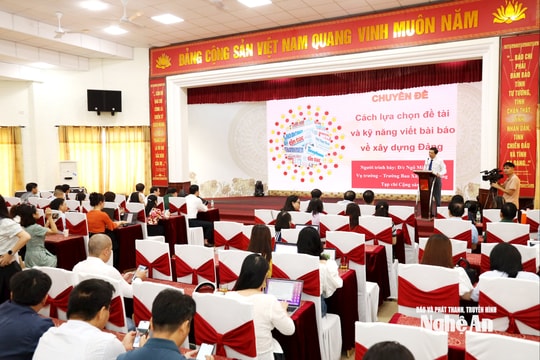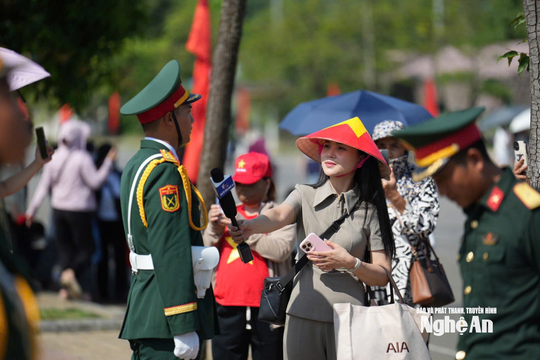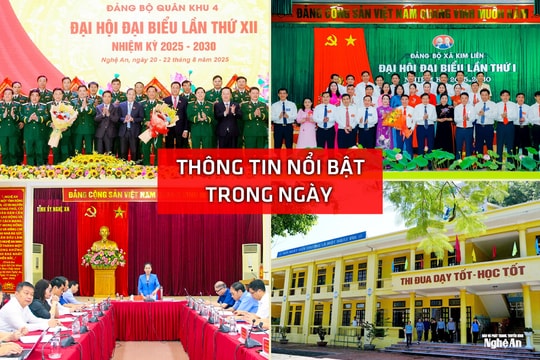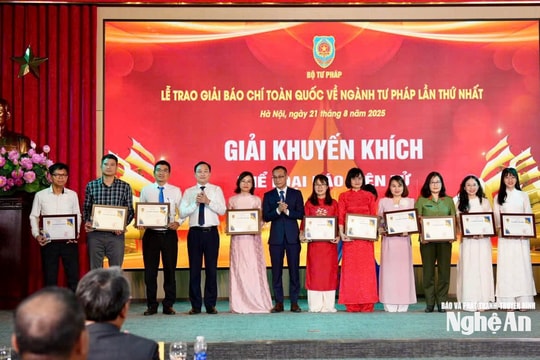What are the criteria for evaluating an effective newspaper?
(Baonghean.vn) - Having been a newspaper manager for many years, I still struggle with the question “What criteria are used to evaluate an effective newspaper?”. The question seems very simple, but to have a thorough answer, there are many issues surrounding it.
Functions of the press
According to Dangcongsan.vn (posted on June 21, 2021): “The press is a type of modern mass media, playing an important role in social life. The press undertakes many social functions such as: Information - communication function; ideological function; monitoring and criticism function; cultural, educational and entertainment function; economic - social service function…”.
Information is the basic function, the original function of journalism.Presswas born to meet and satisfy the information and communication needs of people and society. The more developed the society, the more civilized people are, the higher and more diverse the need for information and communication. The process of meeting this need makes the press develop rapidly. The ideological function is the function that runs through and reflects the nature of the press.
With this function, according to our Party's viewpoint, the press is an important tool and means used to propagate the Party's ideology, educate Marxist-Leninist theory, Ho Chi Minh thought and make ideology and theory become the mainstay and dominant in the spiritual and mental life of the majority of people.
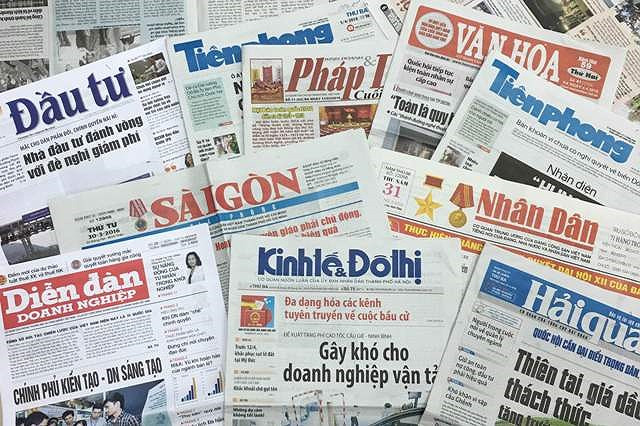 |
| The newspaper is a shock force, taking the lead in the Party's ideological work. Illustrative photo |
The newspaper is a shock force, at the forefront ofideological workof the Party. The management, supervision and social criticism function of the press is reflected in the fact that the press maintains and develops a close connection between the subject and the object of management through maintaining and developing a two-way flow of information, ensuring that management decisions are communicated and implemented, etc. Supervision can be understood as "monitoring and checking whether the regulations are being implemented correctly". That means, supervision includes two processes, monitoring and checking. Supervision is very important in ensuring that activities are carried out for the right purpose and with the best possible results under the set goals, programs and plans. The cultural, educational and entertainment function is understood that the press is not only an important information and communication channel providing information and knowledge, but also a forum for exchanging and sharing skills and rich experiences to improve people's intellectual level, meeting the needs of sustainable development. Special social phenomenon. The system of cultural values exists and develops in the process of exchange and transmission from one person to another, from one community to another and from one generation to another. The press is an important channel providing information, knowledge, education, exchange, transmission and cultural assimilation most effectively. The economic - service function is a function originating from the objective requirements of press activities in a market economy, at the same time, according to the guiding viewpoints of political documents of the Party and the State, such as Resolution 5 of the Central Committee (Session VII), the Press Law and sub-Law documents...
Thus, based on the functions of the press mentioned above, it is difficult to distinguish whether a newspaper is effective or ineffective. If we consider the ideological function, it is clear that newspapers such as Nhan Dan, Quan Doi Nhan Dan, Ha Noi Moi, Lao Dong and some local party newspapers are effective. Similarly, if we consider other functions, other newspapers are more effective.
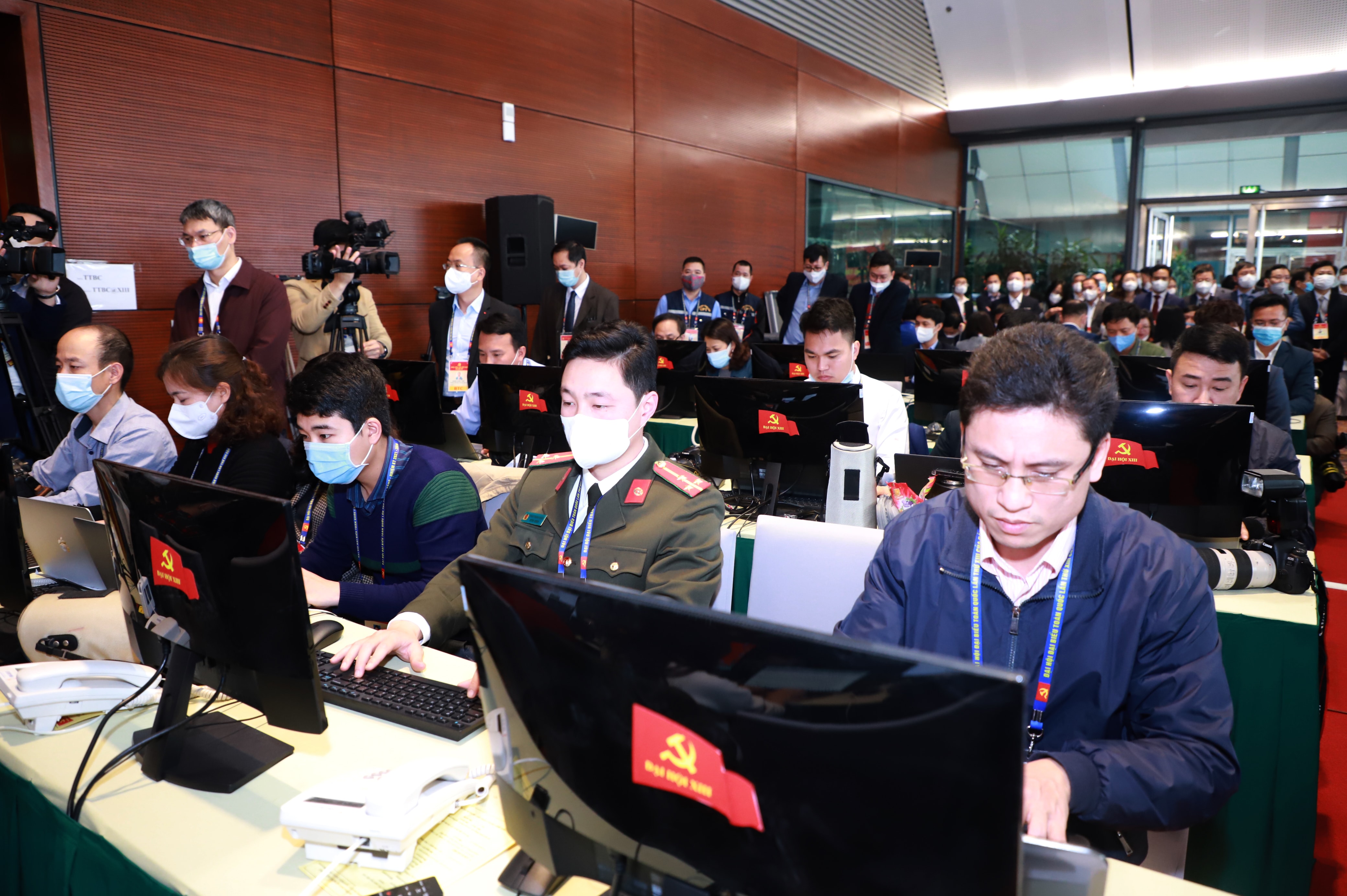 |
| Reporters at a press conference after the 13th National Party Congress. Photo: Thanh Duy |
What are the criteria for evaluating an effective newspaper?
For a long time, we have often heard the term “tabloid” to refer to newspapers that always write about issues that attract likes and views. These newspapers are often considered ineffective. However, in the Vietnamese press, there are also people who argue that there is no such thing as a tabloid, no tabloid news, but only ways to exploit tabloid news. So what is “tabloid” and is it true that “tabloid” is negative and ineffective?
In recent years, the concept of “tabloid” has been almost exclusively mentioned in terms of the style and subject of the newspaper’s reporting. “Tabloid” here should be understood as sensationalist newspapers that are low-quality, report news without reliable sources, disregard ethical and humanistic values for the purpose of making a profit. In terms of ideological and educational functions, “tabloid” newspapers are ineffective.
But what about revenue? Many newspapers considered “tabloids” have high advertising revenue, high page views, and high circulation.
So, should we base our evaluation on advertising revenue or political quality? If we base our evaluation on advertising criteria, where is the function of aesthetic education and social opinion orientation?
Perhaps this is something that all journalists understand. When evaluating a newspaper's strength or weakness, people seem to measure it by the number of copies published or the amount of money earned from advertising. Rarely do we hear anyone mention the political quality of the newspaper's content or the TV program, except for a few provincial leaders, press management agencies, some state officials and a few retired officials. Even journalists rarely express their opinions to defend the effectiveness criteria based on the newspaper's purpose.
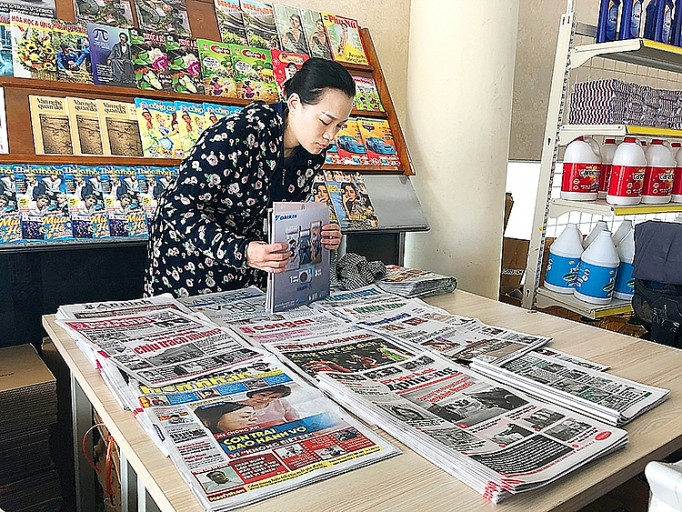 |
| Printed newspapers are sold at Nghe An Province Post Office. Photo: congthuong.vn |
So what is the cause? Why are there such conflicting reviews? Perhaps the root cause is economic issues, operating costs, income, and the lives of journalists...
As of December 31, 2020, the whole country had 779 press agencies, including 142 newspapers (Central: 68, local: 74, 112 newspapers with electronic newspaper activities); 612 magazines (Central: 520, local: 92, 98 magazines with electronic magazine activities); 25 independent electronic press agencies (9 electronic newspapers and 16 electronic magazines). The whole country had 72 agencies with licenses to operate radio and television with 2 national stations (Vietnam Television, Vietnam Television), 1 VTC Digital Television Station, 64 local stations, 5 television units (People's Television, News Agency Television, Vietnam National Defense Television, People's Public Security Television, National Assembly Television).
It is worth mentioning that, of which, more than 70% find their own funding for publishing and broadcasting activities. The number of salaried workers and income workers working in press agencies is over hundreds of thousands of people, not counting a large number of students from journalism training institutions and non-journalism schools who have not found jobs and are working in press agencies. That forces newspapers to rush into making news, news articles, investigating cases to gain readers, high income to cover their operations. Therefore, there is a view that relies on advertising revenue, on views to evaluate the effectiveness of the newspaper.
Currently, some press agencies are operating with financial autonomy such as: implementing the budget allocation mechanism according to Decree 43/CP of the Government, partial or full autonomy. For some large newspapers, TV stations with high capacity, wide coverage, brand name, and high revenue, they are considered to be operating effectively. The rest of the majority of local newspapers and radio stations have to struggle to find advertising and sponsorship to have a source of revenue to balance their operations. Even many representative offices and resident reporters in localities are not paid, and are also assigned revenue allocation. Therefore, it is not surprising that recently, "brokers" of newspapers and magazines at higher levels have frequently called to pressure State organizations and enterprises in the province to publish advertisements with many flowery words.
More daringly, some "brokers" also take advantage of the legal entities of the Party and State agencies at higher levels to request local Party committees and State agencies to post advertisements without knowing whether the partners have a need or not. The situation of unhealthy information competition, news saturation, information duplication, violations of ethics, violations of principles and purposes, loss of prestige and many other shortcomings stem from that.
Many press agency leaders have loosened management, disregarding the orientation of goals and principles of operation to staff and reporters in the editorial office; as long as they get articles with high views, and especially bring in economic contracts and advertising contracts of great value. Currently, there is even a situation where some representative offices operate in the form of "revenue contracting". The editorial office will not be responsible for paying salaries to reporters at the office, but reporters must take care of it themselves. Accordingly, the head of the representative office is given the right to recruit staff and organize activities so that each year the editorial office pays a certain amount of money. This management method inevitably leads to a situation of disregarding the performance of functions and tasks prescribed in the Press Law, not adhering to the principles and purposes of operation.
Instead, journalists have to find ways to bring money to the editorial office as well as to earn income for themselves. From here, "dirty money" has appeared through threats, beatings,... of local organizations and individuals. Many press agencies have been punished, warned, and some editors-in-chief have been temporarily suspended from their positions due to violations of principles and purposes.
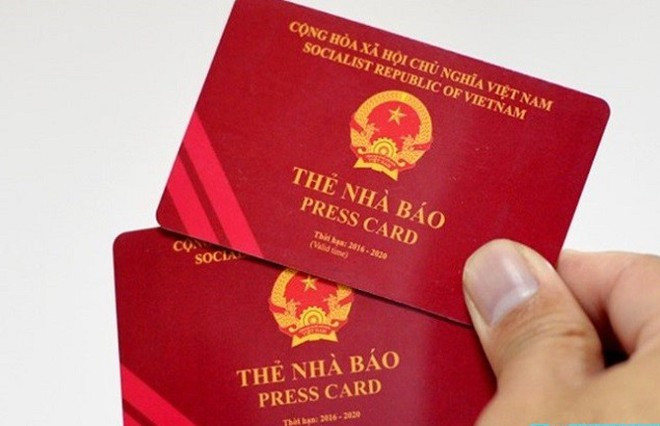 |
| Journalists and reporters must operate in accordance with the principles and purposes of the press agency. Photo: document |
The fact that press agencies, in addition to their political duties, organize advertising information to have revenue and expenses for activities to improve the lives of civil servants and employees so that they can continue to stick with their jobs and not rely on state subsidies is a correct policy that needs to be promoted. However, in order for the press to not get carried away by economics and lose sight of its objectives, the governing bodies should supplement sufficient operating funds for newspapers and radio stations so that they can perform their political functions. At the same time, we must truly consider the press as a non-profit political propaganda tool so that the press can focus on its main tasks and not be influenced by economics that affects the political quality of the press.
Currently, implementing the Press Plan to 2025, press agencies are gradually moving towards financial autonomy, which poses a difficult problem for some press agencies. The State should base on the principles and purposes of the press agency, the political tasks of the country, province or industry to approve policies to order and supplement funding for the press to effectively perform the function of propagating political tasks. At the same time, when evaluating the press, political effectiveness and social stability must be taken as a measure for a newspaper, not looking at the number of newspapers published or the number of viewers watching TV series to evaluate, only then will the press be more confident in focusing on its "Revolutionary" press mission./.

.jpg)

